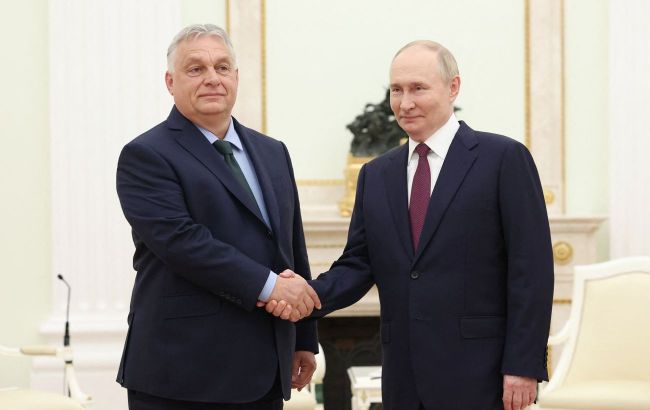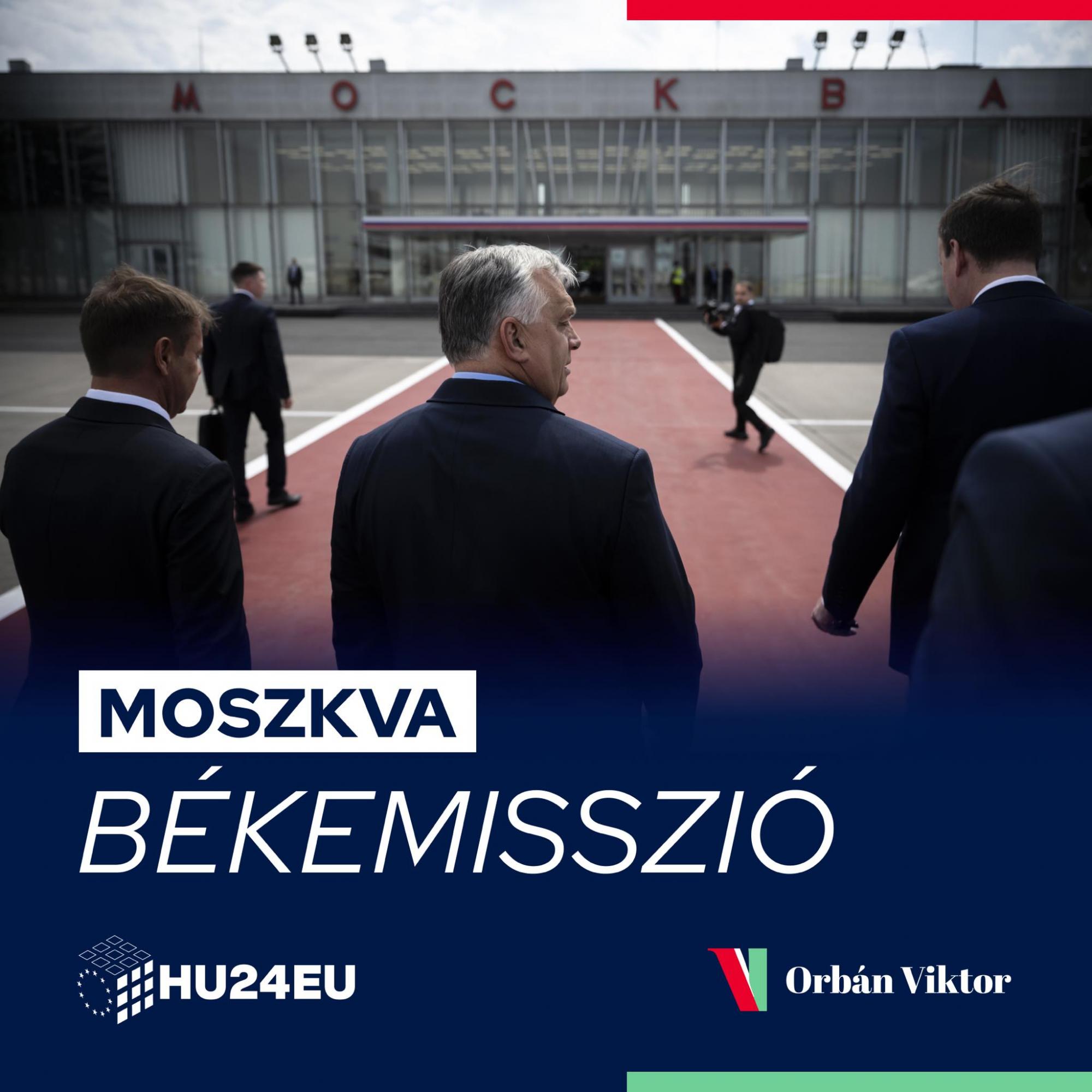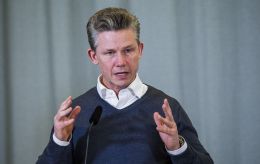'Orbán is playing a game': Why Hungarian PM met with Putin and how EU reacting
 Photo: Hungarian Prime Minister Viktor Orbán and Russian dictator Vladimir Putin (Getty Images)
Photo: Hungarian Prime Minister Viktor Orbán and Russian dictator Vladimir Putin (Getty Images)
Hungarian Prime Minister Viktor Orbán, whose country holds the EU Council presidency, arrived in Moscow on a so-called peace mission after a trip to Kyiv. He met with Russian President Vladimir Putin, and the EU has already stated that this visit is Budapest's initiative and does not change the bloc's position, which stands by Ukraine.
Read about Orbán's visit to Moscow, its purpose, and how European politicians are reacting to it in RBC-Ukraine's article.
Сontents
Orban's visit to Moscow
The first news of a possible visit of the Hungarian Prime Minister to the Russian capital appeared last night. According to media reports, Orbán will visit Moscow together with Hungarian Foreign Minister Peter Szijjarto. The latter has been to Russia more than 5 times since the beginning of Russia's full-scale aggression against Ukraine.
The Hungarian Prime Minister visited Moscow for the last time in September 2022. Back then, he came to attend the funeral of the last leader of the USSR, Mikhail Gorbachev. As for the meeting with Russian dictator Vladimir Putin, Orbán last met with him in October 2023 in Beijing at the One Belt, One Road forum.
This time, Orbán did not confirm that he was planning a trip on Friday. When asked by journalists about a possible visit to Russia, the Hungarian prime minister said that he would talk about it when everything is ready. However, at about 12:30 it became known that the visit would take place. Orbán's plane landed at Moscow airport.
"Prime Minister Viktor Orbán has arrived in Moscow as part of his peace mission. He will meet with Russian President Vladimir Putin," the Prime Minister's spokesperson, Bertalan Hawashi, later informed the media.
Later, the head of the Hungarian government himself confirmed the information by posting a photo on his Facebook page.
"After Kyiv, on to Moscow. The second stop of the peacekeeping mission," Prime Minister Orbán captions the photo.
 Photo: Orbán arrives in Moscow (facebook.com/orbanviktor)
Photo: Orbán arrives in Moscow (facebook.com/orbanviktor)
Orbán and Putin have already met in the Kremlin. The Russian President said that he would familiarize the Hungarian Prime Minister with the nuances of Russia's so-called peace initiative, and Orbán, in turn, said that Hungary will soon become the only country in Europe that can talk to everyone.
All these events are taking place during Hungary's six-month presidency of the Council of the European Union, which began on July 1. However, Orbán claims that this does not give Budapest a mandate to promote peace in Ukraine. According to him, Hungary can be a good tool in the hands of people who want peace and he is convinced that peace talks will be led by big countries.
EU's reaction
The European Union reacted quickly to the Hungarian Prime Minister's trip. President of the European Council Charles Michel emphasized that Orbán has no EU mandate for this trip. In his turn, the head of EU diplomacy, Josep Borrell, said that the visit of the Hungarian Prime Minister to Moscow is taking place exclusively within the framework of bilateral Hungarian-Russian relations.
"Prime Minister Orbán has not received any mandate from the EU Council to visit Moscow. The Hungarian Prime Minister is thus not representing the EU in any form," the European External Action Service says.
European Commission President Ursula von der Leyen reacted sharply to Orbán's visit to Moscow. She emphasizes that appeasement will not stop Putin.
"Only unity and determination will pave the way for a comprehensive, just, and lasting peace in Ukraine," she writes on social networking site X.
For his part, European Commission spokesperson Eric Mamer called the visit wrong and also said that appeasement will not stop Russia. German Chancellor Olaf Scholz also commented on the trip.
"Viktor Orbán is visiting Putin as Hungarian Prime Minister. In foreign policy, the European Council is represented by Charles Michel. The EU's position is very clear: we condemn the Russian war of aggression. Ukraine can rely on our support," he writes in X.
Purpose of Orbán's meeting with Putin
According to political scientist Volodymyr Fesenko, this is Orbán's way of demonstrating the priorities of his EU presidency. According to him, both the visit to Kyiv and Moscow is a demonstration that one of the key goals of the Hungarian Prime Minister is to play the role of a peacemaker.
"And this game is not in Putin's interests. Because these initiatives put forward by Orbán do not correspond to Putin's position in any meaningful way. After all, the Russian dictator does not want to freeze the war, but to capitulate Ukraine with its so-called demilitarization. Orbán makes no such demands. What Orbán is putting forward is an attempt to act as a mediator, a so-called peacemaker. It doesn't matter what the outcome is, the main thing is to demonstrate this role and that "we need to seek a dialogue with Moscow," Fesenko tells RBC-Ukraine.
He explains that this contradicts the official position of the European Union, but Orbán continues to play the game. In addition, the expert believes that the Hungarian Prime Minister is adjusting to Donald Trump, the Republican presidential candidate.
Orbán's so-called peace initiatives are a Trump's play. Because it is the position of his team that is to freeze the war in Ukraine. This visit to Moscow reflects the dual policy of Budapest and Orbán himself. He demonstrates that he wants to maintain special relations with Moscow and wants to negotiate with it, in particular on reconciliation or ending the war in Ukraine," the expert believes.
As for the consequences of such a visit by the head of the EU presidency, the political scientist assures that there is no need to worry because Orbán cannot make decisions on behalf of the European Union alone.
"This is his initiative. He cannot sign any agreements or documents on behalf of the EU. On his behalf - yes. He can initiate some things. For example, convening a conference or raising issues for consideration at EU Council meetings. He can do this as the head of the presidency, but no more. So in this sense, his powers are limited," emphasizes Fesenko.
But these initiatives, which are not coordinated with other EU countries, only increase distrust of Orbán and critical attitude to his actions, the source notes and adds that whether he wants an internal conflict or a split in the EU is out of the question. But as expected, Hungary's presidency of the EU Council will be scandalous.
Earlier, on July 2, 2024, Hungarian Prime Minister Viktor Orbán paid an unannounced visit to Kyiv, almost immediately after Hungary's presidency of the Council of the European Union began. It was his first visit to the Ukrainian capital after a 12-year pause. In particular, following the talks in Kyiv, Orbán offered President Volodymyr Zelenskyy a so-called ceasefire.
Read more about Orbán's visit to Ukraine in RBC-Ukraine's article.
Read about the Western media's reaction to Orbán's visit to Kyiv here.
Sources: Hungarian edition Telex, Hungarian Prime Minister Viktor Orban, European Commission President Ursula von der Leyen, European Council President Charles Michel, EU Diplomacy Chief Josep Borrell, German Chancellor Olaf Scholz, European Commission Spokesperson Eric Mamer, and political scientist Volodymyr Fesenko.

